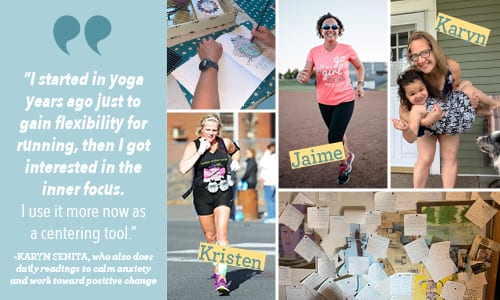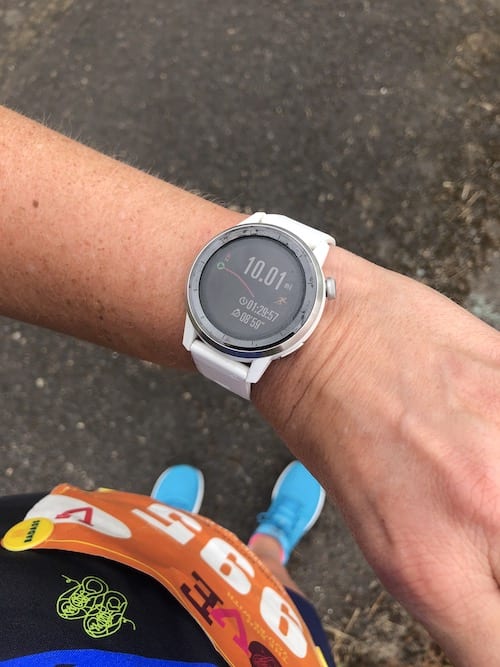Sarah Honors the Miles

10 miles: before + after
The conditions are dang near perfect for nailing my goal in the penultimate virtual race of our 4-race Love the Run You’re With series: 10 miles in less than 90 minutes. It’s overcast. Temps in the mid-50s. The route I’ve chosen on a paved bike trail is flat, scenic, and practically deserted. My legs feel fresh, and I’m excited for the challenge. Almost like magic, I’m able to put myself in the zone, focusing straight ahead with tunnel vision. Other than checking my splits—9:00, 8:56, 8:45, 8:53, 9:00—I don’t look at my GPS.
After sucking down a tasty Strawberry-Banana GU Liquid at the halfway point, I loop around to retrace my steps of the out-and-back course—and immediately am struck by a headwind. It must have been pushing me along. Gulp. “One mile at a time, Sarah; one mile at a time.”
It’s after Mile 6 (8:53) that my self-talk starts in earnest. Maybe it’s the wind, maybe it’s physiological, but the effort feels harder at a slower pace. The mantra, “Honor the miles,” spring into my head. I let it ping around in my monkey-mind for a moment, and it feels right.
It’s a phrase I’ve used before: It means I put in the consistent effort earlier in the race and got the results I was striving for. To pay homage to those miles—and the dedication it took to nail them—means keeping my foot on the gas. To keep striving to hit my goal, rather than throwing in the proverbial towel.
Because, let’s face it, it would be so easy to ease up. It’s a virtual race. Other than the occasional cyclist, no one can see me. Yet I admit to myself how much I want to hit my goal of sub-90 minutes. Because, you see, I played around a bunch with the app Race Pace, and it tells me that running a 10-mile race at that pace would translate into a Boston-qualifying marathon time for me—and today is the day I would have been running the Missoula Marathon if it wasn’t for the stinking pandemic.
So over the next three miles—Miles 7, 8 and 9—I keep repeating “Honor the miles. Honor the miles.” I feel my heart rate shift from Zone 3 to Zone 4 (or so I think—I’m not wearing a HR monitor); my breathing is more labored. I feel dizzy in Mile 8. I really don’t want to keep running at this pace. Yet I (sorta) do: 9:12. 9:20. 9:09. I’m still only looking at my GPS for splits, not elapsed time, yet I know it’s going to be close. I need a big push for the final mile.
My mother.
It’s her 94th birthday. Other than a caregiver, she’s alone in her apartment in a senior living facility, sitting in a wheelchair. I get to be out here, surrounded by tall, waving grasses, wild daisies, and blue cornflowers, with small songbirds swooping about, moving my fully functioning body. I lean in, and go, repeating silently, “Mom. Mom. Mom. Mom.” probably close to 100 times.
Mercifully, my GPS finally beeps for a 10th time, and I press stop. When the final time flashes onto the screen—1:29:57—I shout, “Sweet Jesus!,” which my Catholic mother would not appreciate. But, as much as it feels like she is, she’s not around to hear me.
#422: 2020 Summer Reading Recommendations

The Beauty of Your Face: Sahar Mustafa
The Other Bennet Sister: Janice Hadlow
The Resolutions: Brady Hammes
The Ballad of Songbirds and Snakes: Suzanne Collins
Eight Perfect Murders: Peter Swanson
The Southern Book Club’s Guide to Slaying Vampires: Grady Hendrix
Rodham: Curtis Sittenfeld
Hidden Valley Road: Inside the Mind of an American Family: Robert Kolker
This is Chance: The Shaking of an All-American City, the Voice that Held It Together: Jon Mooallem
When you shop our sponsors, you help AMR.
We appreciate your–and their–support!
Let Cook Smarts plan your dinners: Get 20% off with code AMR20 at cooksmarts.com/amr
Look good, run GOODR: Visit goodr.com/amr to check out Sarah’s favorite goodrs—
and get some of your own!
Make learning about STEAM fun: Go to kiwico.com/amr and get your first month FREE!
#421: Women Runners Share Their Mindfulness Routines

- how “expressive writing” can provide calm and reflection;
- the various ways these women choose—and use—mantras;
- the power of humor (including foul-but-funny coloring books!);
- what “box breathing” is and what it can do for you; and,
- how spending a little time using a mindfulness “tool” can provide big rewards.
The first guest starts sharing at 14:09.
When you shop our sponsors, you help AMR.
We appreciate your–and their–support!
Let Cook Smarts plan your dinners:
Get 20% off with code AMR20 at cooksmarts.com/amr
Look good, run GOODR: Visit goodr.com/amr to check out Sarah’s favorite goodrs—
and get some of your own!
Be kind to your skin: Get 15% off your first purchase at TrueBotanicals.com/amr
using code AMR
#420: Running and Weight-loss Transformations

- the value of celebrating “non-scale victories (three cheers for on-the-toes push-ups!);
- the importance of compassion, curiosity, and consistency;
- the reality of being in the “injury-corner,” and regaining some weight; and,
- creating spaces (a she-shed, perhaps?!?) to do “thought downloads” and strength training.
In the intro, laugh along as Sarah proudly accepts the label “schleppy-preppy!” The first weight-loss wonder starts sharing at 15:09.
When you shop our sponsors, you help AMR.
We appreciate your–and their–support!
Look good, run GOODR: Visit goodr.com/amr to check out Sarah’s favorite goodrs—
and get some of your own!
Join Thrive Market today, and get up to $20 in shopping credit
toward your first order at ThriveMarket.com/AMR
Switch to Nom Nom today and get 50% off a 2-week trial. Go to TryNom.com/AMR
#419: Special Episode: Race + Running

- -when they first realized how white the sport of running is;
- -the necessity of picking “safe” routes and times of day to run;
- -the support and camaraderie the group Black Girls Run! provides them;
- -how a “raggedy” conversation is better than no conversation at all.
Running Through It: Wishes for a Black Teenage Son

It was mid-March when the stitching of everyday life began to unravel, thread by thread. I think when I stopped using a calendar, the free-fall began. Other than the date on my Garmin, time began to have very little meaning. No appointments, no school pick-ups or drop-offs, no sports practices, no classes at the gym.
Suddenly, my days became reruns of one another. I would try to work a little, help with school if my teen needed it, cook and cook and cook some more. (Our dishwasher gave up and broke 20 days after the one-year warranty expired, because of course it did.) I felt untethered by the lack of variety in my days, which was startling. I found out quickly that slowing down is one thing, but life coming to a screeching halt is entirely different.
And then, on May 25, the death of George Floyd, and time imploded.
Before I go any further, it is important for me to say that I am a White woman who carries a ridiculous amount of privilege. I move through the world in a way that shields me from a whole lot of difficulty. I can not speak to the experiences that a person of color has had, and I will not try to.
I am a parent who wants to raise healthy, kind, open-minded kids that grow into healthy, kind, open-minded adults. In this moment of time that feels frozen and stuck and overwhelming, my dreams for my children are no different than yours. The main thing that sets me apart from other White women who are trying to do the same is that my children are Black.
I feel lucky that my youngest son loves to run. This sport has been a form of escape for him and (selfishly) for me, his biggest fan. Even though he is one of just a few Black runners in our state in the sport of cross country, he has embraced it whole-heartedly. I experience pure joy when I see him laying it down out on the course. His red singlet clings to his sinewy frame, and he flies past me in a blur. I cheer until I’m hoarse. For those few minutes, he’s just a kid running, and I’m left racing against the clock to try to catch him at the finish. He’s good enough he earns the respect of others who are watching him.
It’s a different story when he goes out for a run in our neighborhood, in a hoodie, and I count the minutes until he is home safely. “How long will you be gone?” I always ask him, and I am left behind to wait, while time unspools before me in an endless line of uncertainty.
He will earn his driver’s license in a few short months, and he will join his older sister and brother and every other Black driver in the United States who must learn how to respond if pulled over by the police. He will have to continue to navigate living in a world that is suspicious of him, makes wrong assumptions about him, and—based on statistics—values his life less than those of his White peers.
I have dreams for him to run in college, and I have a more important dream that he will still be alive at the end of college.
As hard as it is to believe right now, there will come a day when the current headlines will be behind us. We will move forward to business as usual. It will feel as if the stitching of our lives has been sewn up neatly.
But hopefully not too neat. As we sew together the frayed fabric of our justice system, I hope we see the patched areas for what they are: part of a broken system and a marker in time when we began the work to fix it. Our greater calling is to do the work to better ourselves, educate ourselves, and empathize with the groups of people who have been oppressed for far too long.
My son’s calling? It should be as simple and carefree as running as fast as he can. We all know it’s not, but we can work toward that ultimate finish line together, one step, one mile, at a time.



